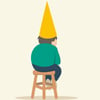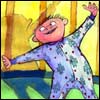On the frequent occasions when Malka joins the large crowd of singles we host Friday nights at our Shabbat table, she is generally a good forty years older than any other guest present. But no one should be fooled by her age.
The person sitting next to Malka will surely hear about something she learned at the most recent 24-hour Torah-thon she completed, or about a conference on acupuncture or pharmacology or Yiddish poetry that she attended that week, or her activism in promoting Holocaust education for young people.
Malka was six years old when she saw her family for the last timeWhen Shabbat is over, Malka is on the phone asking for the phone number of one of our guests. She has a young woman in mind for that young man who was at the table, or knows about an empty apartment, or has a job lead for someone she met.
Over the past decade as a regular at our Shabbat table, Malka has slowly but surely become one of our favorite human beings.
Over these years, I have managed to gather only snippets of information about her past as a child survivor of the Holocaust. I heard about how she was frequently transferred under the cover of night to new hiding places to avoid capture, and of her parents and siblings whom Malka last saw at the age of six when they were taken from her by the Nazis.
But for all of these years the spunky, life-affirming Malka I know and these heartwrenching stories of a very young girl left on her own to fight for survival in Nazi-occupied Europe, didn't seem to match.
So this past week, I spent a few hours with Malka trying to figure out what her secret is.
To my surprise, Malka explained to me that the "secret" is her mother and father, and the life lessons that they managed to teach her until the tender age of six.
When I look at my own four-year-old, I have a tendency to think of her as little more than a baby who will quickly forget the things she learns from me or my husband or her older sisters. But Malka's personal stories (as well as increasing scientific evidence) prove that I am downright wrong to underestimate the powers of observation and retention of this 4-year-old sponge who is constantly learning from what she sees going on all around her.
When I asked Malka, for example, how she became a person who is always looking for opportunities to help others, she recalled the influence of her father, a wealthy grocery storeowner."When I was four years old, I noticed that my father had two separate stacks of unpaid bills on his check-out counter. When I asked him why there were two piles, he told me that I must keep it a secret, but he kept one pile for regular customers and one pile for poor people that he threw away at the end of each day."
When I asked Malka about the source of her life-long dream to move to Israel which she realized in 1993, she recalled, "When I was a little girl, maybe three or four, I loved to gaze at the photographs my mother had posted behind the charity boxes of holy places in the Land of Israel."
He kept one pile for regular customers and one pile for poor peopleWhen I asked her about her pride and joy, her three sons, who all chanted from the Torah in their family synagogues and on a professional basis, she remembered, "When I was five years old there was a rumor that pro-Nazi hoodlums would be attacking a synagogue. My father ran into the shul at the same time that the Nazi supporters were storming in with their torches and barking dogs and rocks to break the windows. My father escaped with a Torah scroll hidden inside his jacket. I never told this story to my sons when they were little, but on their own they decided to become prayer leaders after their bar mitzvah. I believe this decision was a reward for my father's sacrifice and in his merit."
When I asked Malka about her great thirst for knowledge, and her famously tireless attendance of classes and conferences, once again she credited her parents, "My parents always told me, 'Every day you must learn something new. Open a dictionary or an encyclopedia. Or better yet, the Bible, or Psalms. Read even just one verse. What you learn and what you retain nobody can ever take away from you.'"
The six and a half decades since Malka's parents, brother and sister were brutally murdered have been filled with hardships that are difficult to fathom. Malka recalls, "During the war, my life was constantly in great danger. I was moved more times than I can remember, to farms, to convents, to warehouses filled with rats."
To this day, Malka's memories of these treacherous nighttime transfers prevent her from falling asleep until sunrise.
Wherever she hid, the Nazis were close behind. "One orphanage where I was hiding," Malka remembers, "was so overcrowded that they would give the babies to the children to take care of them. I enjoyed doing this, because for me the babies were like dolls.
"Once a Nazi came to take my baby away, but I refused to hand her over. The Nazi picked me up to put me into the truck along with the baby, but the orphanage director told him that he could not take me for some technical reason. He was so angry that he picked me up by my ear and threw me against the side of the building. I went down like a sack of potatoes. I don't remember anything after that. For months I was kept in an upstairs hallway while they waited to see if I would survive."
And after the war, the difficulties did not end for Malka. The malnutrition and physical mistreatment that she had suffered during the war resulted in chronic health problems.
My father escaped with a Torah scroll hidden inside his jacketWhen Malka married her husband at the age of 23, her traumatic experiences also made it difficult for her to conceive and she suffered many miscarriages. Malka eventually gave birth to three sons, one of whom died when he was hit by a bus at the age of seventeen. Her husband died ten years later of cancer, leaving her to face life on her own once again as a young widow. To this day, the sadness of these painful losses hangs over her, and she refers to them frequently.
And through all this, the lessons that Malka received during the few years she spent in her parents' home have served as her guiding inspiration through the darkest moments of her life.
Malka explained, "My mother and father taught me many important things. But most importantly, they taught me that even at the hardest times I should be grateful every morning and every night for the blessings in my life. My parents taught me that one is allowed to be sad and miss those who are no longer with us. But we are required to look on the positive side of things and remember that even if we are in a bad situation we still always have more than someone else. For as long as I can remember, this has been my philosophy of life."
Rabbi Sholom DovBer (the fifth Rebbe of Chabad-Lubavcitch, 1860-1920) would say: "Just as we are commanded to put on tefillin every day, we are commanded to spend at least a half an hour each day thinking about our children's education."
Malka's life story explains why this is so.
Her story teaches us the great power that parents have to educate their children to be good people and good Jews, as Malka's parents did. It teaches us how the decisions we make and the things we say are carefully recorded by these little people who share our homes. It teaches us that we have the ability to equip our children with the tools and the faith to struggle through and survive the darkest chapters of their lives.
Malka's story pushes us to ask ourselves every day what our own children are learning from us, and with what lessons and rare gifts we will send them forth into the world when the time comes.
Every time Malka leaves our home, without fail she thanks us for our hospitality. Yet we are the ones who feel we should thank her. Malka's parents taught her, and in turn she has taught us many great lessons that we hope to pass on to our children, and G‑d willing, they to their children, Our enemies may have succeeded in killing the bodies of Malka's family, but their souls and their message will live on forever.









This is a great touching story. Our parents do live on inside of us.